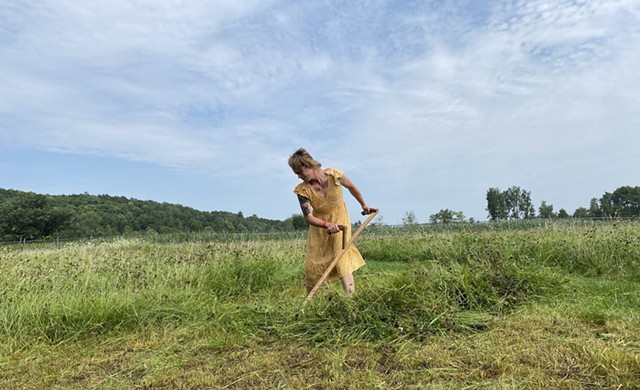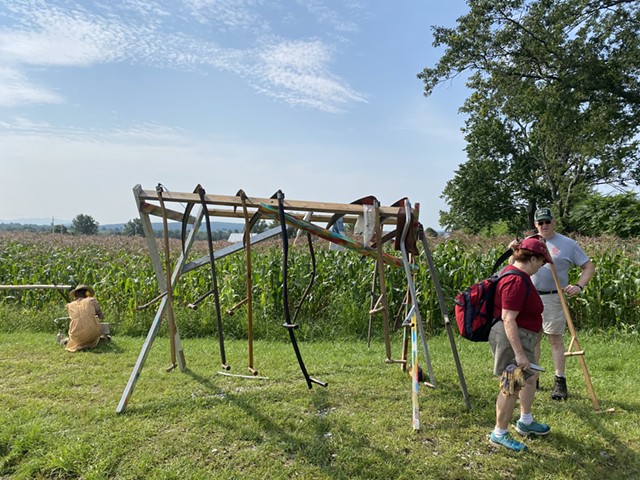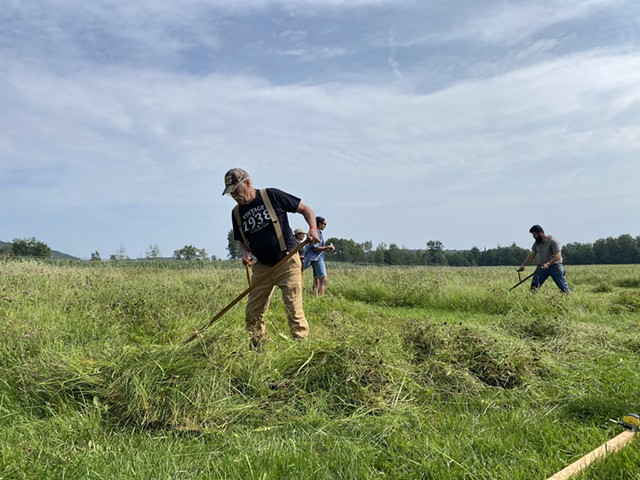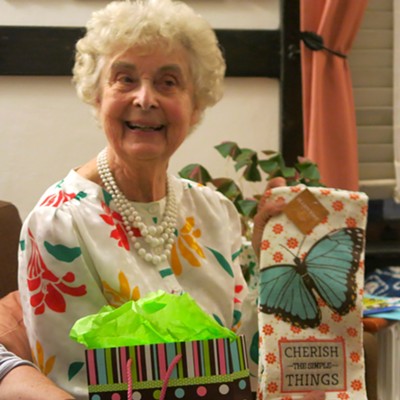
- Rachel Hellman ©️ Seven Days
- Autumn McCarthy competing in the hand-mowing competition
The morning sun beat down as Antoine Waithe sharpened his scythe. He knelt in the grass, carefully handling the tool. Its long, handsome blade caught the light.
It was a hot Thursday in August, and the Addison County Fair & Field Days, an annual celebration of rural life, was in full swing.
The quintessential country fair, which ran from August 8 to 12 in New Haven, had everything from a demolition derby to an arm-wrestling competition. It also featured one of only two hand-mowing competitions in the country.
Tucked behind the antique equipment demo area and rolling rows of corn was an inconspicuous field of tall grass where the morning’s contest would take place. Far away from the loud rides and vendors, the field was delightfully private. A growing crowd of onlookers claimed their seats on a set of bleachers as scorekeepers powered up their computers under a tent.
A flock of competitors practiced swinging their scythes — a tool used for cutting grass with a long, curved blade that was first used in 5000 BC — on a practice field. Some competitors, such as 85-year-old Don Elder, used an American-style scythe with a long, heavy, curved blade. Others, including Waithe, swung a European-style scythe with a shorter, thinner blade.
There’s no entry fee to compete and no cash prize. Competitors participate for the joy of hand mowing.
Each person in attendance found themselves at the competition for varied reasons. Waithe and his partner, HaQuyen Pham, are “super green-focused” according to Pham and first started hand mowing on their seven-acre property in Middlebury in an effort to whack weeds without using gas-powered tools. Waithe learned how to use a scythe by watching YouTube videos but soon discovered a vibrant hand-mowing community in Vermont.
Meanwhile, Melvyn Carrington, who sat in the bleachers, used a scythe while growing up in the Caribbean. Now he and his wife are hoping to add the tool to their arsenal in Bristol.
Among those practicing their strokes was Aisha Thapaliya, a Middlebury student who learned to use a scythe as a summer employee of the college’s working farm. Thapaliya and other Middlebury students entered the competition and volunteered to keep time.
“At first, I was going for quality,” Thapaliya explained of her approach to the competition. “But now, I’m just going to try to get to the end as quickly as possible.”

- Rachel Hellman ©️ Seven Days
- Scythes hanging at the ready
“All right, the competition is about to begin,” said Judd Markowski, announcer and competition co-organizer. He learned how to hand mow while working at a dairy farm.
He described how the event would work: Competitors — divided by age and gender — would be judged by the width of their swath, the “evenness of their stubble,” and the speed at which they moved through either a 15- or 25-foot field. Scores were calculated by averaging the numbers in those three categories.
“But above all,” Markowski said in a singsong voice, “the competition is meant to be fun.”
First up was Jim Merrigan, a middle-aged man whose long, consistent scythe swings were "exemplary," Markowski told the crowd.
“Get your corners, Jim!” a woman wearing a shirt from a log-rolling competition shouted from the sidelines. The cut grass left behind — known rather poetically as the windrow — piled neatly at the edges of Merrigan’s clearing.
Once he finished, Thapaliya stopped her timer and a team of volunteers lugged a long, wooden pole with four measuring tapes over to the field. Then they began calling out the width and height of the grass left behind. A serious-looking man with a clipboard jotted the digits down.

- Rachel Hellman ©️ Seven Days
- Competitors hand mowing
Among the brigade of scorekeepers was Michaela Stickney, who runs a free “scythe school” in Huntington and co-organizes the event with Markowski. She was impressed by the 30-person turnout this year, which included a striking number of women, gender-fluid individuals and young people.
“A lot of people connect to the earth in this way,” Stickney said. “It’s poetic. It’s meditative.”
For Autumn McCarthy, who competed in a long yellow dress, a cowboy hat and sandals, hand mowing is not just a way to cut grass but also a grounding practice. She first learned how to use a scythe from Stickney and Marc Shattuck, a metal welder who makes scythes and stood nearby.
“Autumn over there is doing a really, really nice job mowing,” Markowski called out as she swung back and forth, her body following the extended line of her wooden scythe in a rhythmic pattern. Her face narrowed in focus. “Very even stubble, very even parallel lines and a nice windrow,” Markowski said.
At the conclusion of her turn, McCarthy hugged Shattuck, who beamed at his hand-mowing student in approval. McCarthy caught her breath, stopping to ponder what exactly about hand mowing she found so cathartic. The windrow ruffled in the breeze.
“It’s really quiet,” McCarthy said, finally. “It’s a quiet feeling in my body.”
Correction, August 17, 2023: The field days are held in New Haven; a previous version of this story contained an error.



Comments
Comments are closed.
From 2014-2020, Seven Days allowed readers to comment on all stories posted on our website. While we've appreciated the suggestions and insights, right now Seven Days is prioritizing our core mission — producing high-quality, responsible local journalism — over moderating online debates between readers.
To criticize, correct or praise our reporting, please send us a letter to the editor or send us a tip. We’ll check it out and report the results.
Online comments may return when we have better tech tools for managing them. Thanks for reading.